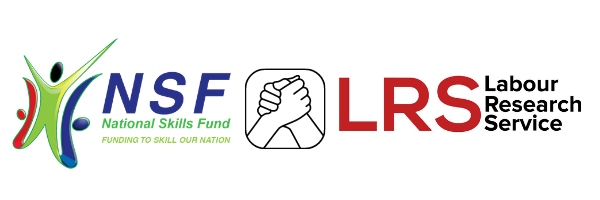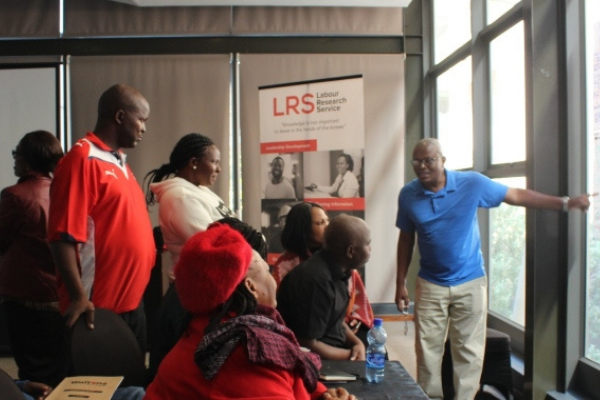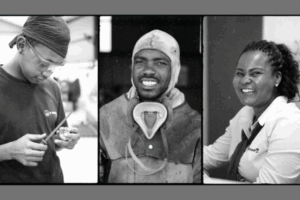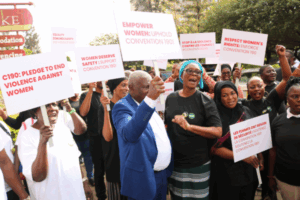Organising is the process of bringing different workers together in a workplace, sector or industry so that they can engage the employer(s) collectively and negotiate better wages and conditions of employment. Organising helps trade unions to increase membership in order to build strong and effective organisations that can effectively defend workplace rights.
Indicators of an organised workplace
- high level of union membership and activity
- union officials in all areas of the workplace who are well trained and have enough time off
- union meetings are well attended
- union members prioritise and are involved in branch activities
- the union communicates with members regularly using a variety of techniques.
Organising in the present context
Trade unions exist to enhance and maintain the standard of living of their members through negotiating with employers for decent wages and conditions of work. Unions do this through organising and providing various services to their members.
South Africa’s struggling economy has affected the labour sector. Companies are retrenching, outsourcing, downsizing, restructuring and implementing technological changes to save on costs. On the other hand, unions are hard-pressed to navigate the challenging environment and get wins for their members.
The country’s informal economy is burgeoning, driven by a high unemployment rate and sluggish economic growth. The government has shown commitment to supporting the growth of the informal economy, but firm policies are needed and particularly policies for improving incomes and conditions of work. One-third of South Africa’s workforce is in the informal sector, and that’s a significant number of working people. Different types of workers can be found in the informal economy. From the street traders, waste collectors and hair salon workers to the people working informally in private homes and formal companies, the struggles for workers are largely the same and characterised by poor pay, job insecurity and little social protection.
Union organising in the traditional workplace is stressed by various factors, including the practice of labour brokering and the lack of renewed organising strategies for a changing workplace. The informal economy presents an opportunity for worker organisations to grow their membership, but the sector would require different tactics. To remain relevant, trade unions need to adapt to external and internal challenges in the changing labour market.
Challenges to organising workers
Union fragmentation - No longer 'one union, one industry'
Trade union organising is further challenged by the continuing fragmentation of the movement. One consequence of this fragmentation is union duplication at the sector and company levels. This breeds rivalry that can lead to workplace violence as competing unions enter the same spaces to organise workers. Additionally, the fragmentation of the movement threatens unions’ broader goal of building solidarity, which is the linchpin of any effective trade union movement. For employers, the duplication of collective bargaining agreements in a multi-union workplace can be an issue.
Declining trust in trade unions
The majority of working-class South Africans distrust trade unions. A study by the Human Sciences Research Council of South Africa found that while 43% of respondents trusted trade unions in 2011, 29% of people had the same view in 2012. The causes of the distrust varied from not knowing much about unions to poor member services and bad governance of unions.
More recently we got an inkling of why workers are wary of unions. Worker representatives in our collective bargaining support forums in 2019 and 2018 said the majority of young workers know about the issues in their workplaces and aren’t entirely negative about the idea of unionism. Rather, young people seemingly know little about the existing trade unions and believe unions aren’t relevant today. They also think that the trade union movement is too politicised.
So, have trade unions become irrelevant today? I think not and I tend to agree with activist groups with views akin to the Southern African Catholic Bishops’ Association that stated: “As long as there exist economic activity where collectives of one sort or another are involved, with control and benefits being negotiated, unions will always be necessary as a fundamental expression of the need for human collectives to work together for justice, especially in the economic context…”
Old methods in a new context
The changing workplace has made union organising more difficult but not impossible. Young workers today are educated about their rights and are ardent users of technologies like social media. Yet many unions haven’t quite adapted to the new ways of recruiting young workers and continue to use old organising methods like mass meetings. Also, unions still prefer to organise unionised workers, excluding the unorganised.
A union official I spoke with highlighted the following organising challenges:
Inefficient provision of services – It’s difficult to organise workers at a company that was once organised but didn’t get proper services from the union. These workers stop trusting unions.
Territorial tendencies of shop floor officials – Some unions provide incentives such as money to motivate shop stewards to recruit new members. Shop stewards then become territorial and to the detriment of the union’s organising efforts.
Intimidation by employers – Bosses routinely threaten unionised workers with dismissal, causing some members to leave unions for the sake of keeping their jobs. The intimidation by some employers frustrates the work of union organisers.
Corruption – Some union officials are more interested in the union’s coffers than maintaining sustainable worker organisations.
Old-guard clinging to power – Veteran unionists continue to dominate union structures and resist renewing organisational strategies to capture the young worker. In comparison, progressive unions led by young leaders, for example, the Communication Workers Union, have managed to grow their membership.
Lack of effective awareness campaigns/education – Union awareness campaigns have stuttered due to complex factors. Thus, the typical South African worker might be ignorant about the role of worker organisations because they lack adequate awareness campaigns.
Organising methods developed by South African trade unions
"SACCAWU’s mall committees remain a relevant and innovative organising strategy. These committees empower members to organise and access union information, particularly reaching workers who are traditionally hard to engage. Shop stewards represent union members in locations lacking strong shop floor representation. For instance, a shop steward from Shoprite can negotiate for workers in a neighbouring Chicken Licken outlet within the same mall."
Thokozile Mchunu, Regional Educator at SACCAWU
"In today's age of social media, accessing information is fast and effortless. Larger unions appear to lag behind smaller ones in disseminating information. Those unwilling to adapt their organisational structures risk survival; outdated deployment practices no longer align with current realities. Embracing dynamic and passionate young leaders is crucial for unions' evolution. In summary, our unions urgently need modern organisational frameworks, drawing inspiration from successful models in other organisations."
Shiyinduku Twala, National Negotiator at SADTU
Conclusion
Trade unions are still the best organisations for protecting the interests of workers. Organisations need to focus on renewing their organising methods and improving service delivery to their members in order to retain them. Unions must also strive to have inclusive collective bargaining agreements that are shaped by the needs of all workers. An inclusive CBA takes into account the changing workplace and the need for collectives to respond to the changes.
*The LRS works to promote informed social dialogue by addressing information and skills asymmetries in collective bargaining in South Africa. This work is made possible through the support of the National Skills Fund of the Department of Higher Education and Training.

- Recruiting workers to the trade union – tips for organisers
- Inspiring women organising strategies: The Mall Story | The Train Story.







